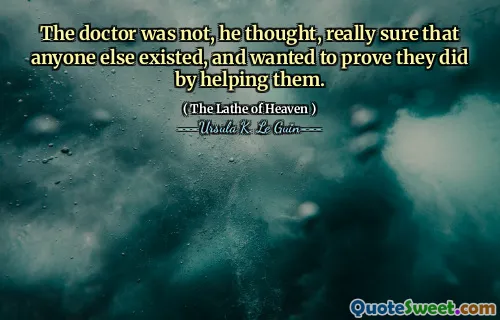"The Lathe of Heaven," written by Ursula K. Le Guin, presents a thought-provoking narrative centered around George Orr, a man whose dreams possess the power to alter reality. Struggling with his extraordinary ability, he seeks help from a psychologist, Dr. Haber, who becomes increasingly fascinated by Orr's dreams and their implications. As their sessions unfold, the boundaries between dream and reality blur, leading to unforeseen consequences in the world and Orr's life.
The story delves into themes of power, control, and the ethical dilemmas surrounding the manipulation of dreams and reality. Dr. Haber's attempts to harness Orr's power for personal and societal benefits raise questions about ambition and morality. As Orr's dreams reshape the world, the narrative explores the unintended ramifications that come with such alterations, prompting a reevaluation of desires and the nature of reality.
More »
Today Birthdays
1729 -
Edmund Burke
1949 -
Haruki Murakami
1954 -
Howard Stern
1876 -
Jack London
1993 -
Zayn Malik
1951 -
Kirstie Alley
1863 -
Swami Vivekananda
1923 -
Alice Miller
1987 -
Naya Rivera
1825 -
Brooke Foss Westcott
1944 -
Joe Frazier
1951 -
Rush Limbaugh
1964 -
Jeff Bezos
1978 -
Jeremy Camp
1628 -
Charles Perrault
1856 -
John Singer Sargent
1970 -
Kaja Foglio
1953 -
Rick Santelli
1986 -
Gemma Arterton
1968 -
Raf Simons
1958 -
Christiane Amanpour
1966 -
Olivier Martinez
1996 -
Ella Henderson
1917 -
Maharishi Mahesh Yogi
1949 -
Ottmar Hitzfeld
1928 -
Ruth Brown
1968 -
Heather Mills
1946 -
George Duke
1968 -
Rachael Harris
1923 -
Ira Hayes
